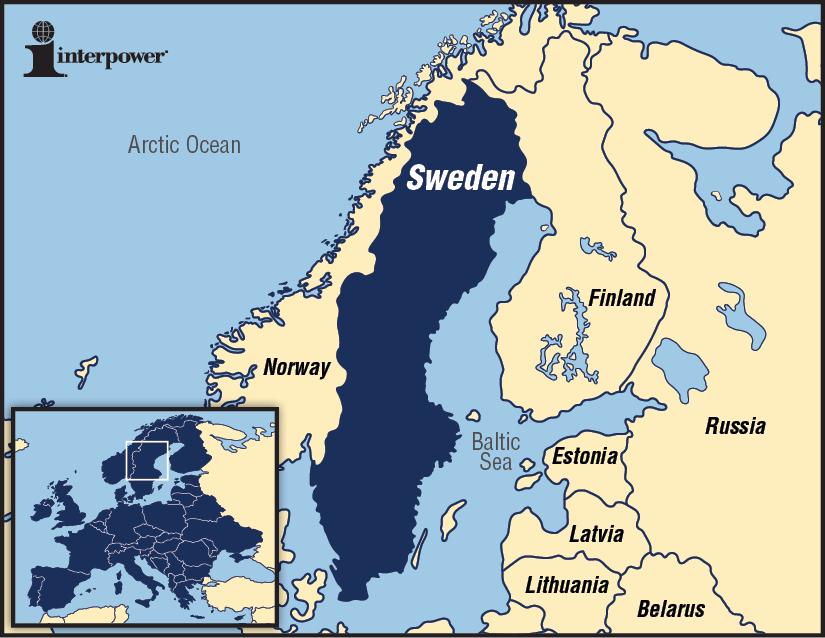Exporting to Sweden
Posted on 7/5/16 12:00 AM

| SWEDEN | |
|---|---|
| Actual population* | Population world ranking |
| 9,723,809 | 91 |
| Actual GDP (PPP)* | GDP world ranking |
| $393.8 billion | 35 |
| Actual GDP (per capita)* | GDP (per capita) world ranking |
| $40,900 | 26 |
*See the end of this blog for definitions
Sweden is one of the Nordic countries which also includes Denmark, Finland, and Norway. Together these countries have diversified trade markets and receptive business environments.
Sweden is the largest among the four Nordic countries. As a leader in research and development, new advanced technologies are encouraged which helps to make it a good place to use as a test market. A market strategy to consider is working with an agent or distributor. Evaluate potential partners carefully and from the beginning, visit the country to establish a good business relationship with that person. Demonstrate the desire for a long-term commitment and make sure all agreements that are made are in accordance with the European Union and member state laws.
It’s important to note details regarding cultural differences so determine what is acceptable in Sweden. Scheduling and punctuality are crucial. Meetings are expected to begin on time and follow the agenda set. Learn what is acceptable for business attire and when it’s appropriate to give gifts. Have business cards available for distribution.
To discover more about the business customs in Sweden, market entry strategies, and import/export requirements, resources to consult include the United States Commercial Service and the United Kingdom Trade and Investment.
Located in Northern Europe, Sweden joined the European Union in 1995. The EU is a Customs Union which consists of member countries who have formed a single region for customs purposes. Goods that have been imported legally can circulate throughout the EU with no further customs checks. To learn more about the customs regulations, among the sources to consult are the European Commission Export Helpdesk and European Commission Taxation and Customs Union. Conducting due diligence in accordance with all of the regulations is essential.
Some products may require safety testing and certification for this market. While not all products are required to have a CE mark, others do require one. When affixing the CE mark to a product, a manufacturer affirms that the product meets the necessary requirements and can be sold throughout the EU.
There are also EU regulations that need to be followed, so it’s important to know what is required in Sweden. Among them are:
- REACH is the European regulation for Registration, Evaluation, Authorization, and Restriction of Chemicals. The European Commission works closely with ECHA (European Chemicals Agency) in the implementation of this regulation.
- RoHS stands for Restriction of Hazardous Substances. It restricts the use of certain hazardous materials found in electrical and electronic products.
- WEEE stands for Waste from Electrical and Electronic Equipment. WEEE requires the treatment, recovery, and recycling of electric and electronic equipment.
While Swedish is the official language of the country, English is also widely spoken and used frequently within the business community.
In Sweden, the voltage used is 230V at 50Hz. The most frequently specified plug pattern is the Continental European plug.
Sources:
www.export.gov/sweden
www.gov.uk
Sources for European Union:
www.ec.europa.eu
www.echa.europa.eu
www.rohsguide.com
www.exporthelp.europa.eu
www.europa.eu
www.export.gov/europeanunion
*Source: www.cia.gov/library/publications/the-world-factbook/index.html
Country comparison—Population: Population compares estimates from the US Bureau of Census based on statistics from population censuses, vital statistics, registration systems, or sample surveys pertaining to the recent past and on assumptions about future trends. (July 2014 est.)
Country comparison—GDP (Purchasing Power Parity): GDP (purchasing power parity [PPP]) compares the gross domestic product (GDP) or value of all final goods and services produced within a nation in a given year. A nation’s GDP at PPP exchange rates is the sum value of all goods and services produced in the country valued at prices prevailing in the United States. (2013 est.)
Country comparison—GDP – per capita (PPP): GDP – per capita (PPP) compares GDP on a purchasing parity basis divided by population as of 1 July for the same year. (2013 est.)




